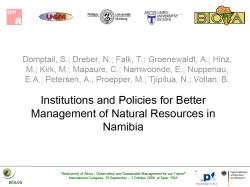|
|
|
 |
|
|
Presentation
< back to presentation overview
| Details of the presentation |
| Presentation |
Oral presentation |
| Title |
Institutions and Policies for Better Management of Natural Resources in Namibia
|
| PDF Download |
 Download PDF (Filesize 1.1 MB)
Download PDF (Filesize 1.1 MB)

|
| Short title |
Institutions and Policies for NRM in Namibia
|
| Author(s) |
Domptail, S.(1); Falk, T.(2); Hinz, M.(3); Kirk, M. (1,2); Popp, A.(4); Unanivi, V.(3); Muhongo, M.H.(3); Namwoonde, E.(3); Mapaure, C.(3)
|
| Presenting author |
Nuppenau, E.-A.; Falk, T.
|
| Institution(s) |
(1) Institute of Agricultural Policy and Market Research, University of Giessen; (2), Institute of Co-operation in Developing Countries, University of Marburg; (3), Faculty of Law, University of Namibia; (4) Department of Plant Ecology and Nature Conservation, University of Potsdam,
|
| Keywords |
Institutions; Policies, Customary Law; Land Tax; Dissemination
|
| Abstract |
Institutions and policies determine the public framework and incentives for individual and collective management of natural resources and biodiversity protection. Research showed that efficiency of the regulatory framework for nature based income generation highly depends on participation, stakeholder communication and cooperation, all being key issues in intervention research. We inform about mechanisms and problems of policy debates to implement bio-diversity relevant decisions in the Namibian policy arena. We provide cases from different levels for Namibian policy makers as a basis to improve decisions regarding biodiversity management.
As for the legal framework, community consultations about legal anthropological research emphasized problems on the interface between statutory law and law of the communities. They are traced back to confusing political approaches on what the land tenure system should be in a legally pluralistic Namibia: unfinished compromises exist between state-favoured models with the state being ultimate owner of all natural resources and the community-supported holistic concept with traditional communities having overall responsibility over natural resources. These contradictions are to the detriment of a policy to maintain biodiversity. Policy options will be explored with recommendations to law interpretation and law reform by thus assessing one of the key elements in the Namibian institutional framework.
An ecologically oriented land tax is one economic instrument for a more sustainable use of rangelands. The suggested tax design is based on the recognition of future eco-system services which are delivered by healthy rangelands. Our contribution shows how a differentiated tax according to an identified veld quality contributes to sustainability. Scenarios of actual and proposed tax designs are run using a bio-ecological model. With this, we integrate the new concept of state-and-transition for rangeland ecology in order to represent the ecological dynamics of the range in conjunction with the tax. In addition, the recursive structure conveys the ability of the model to simulate farmer decision making. Using this tool we can model the impact of several tax designs on farmer strategies and on the range.
|
| Congress Topic |
Interventions
|
| Topic No. |
4.8 |
| Notes |
---
|
| Ref. No. |
598 |
|
|
|
